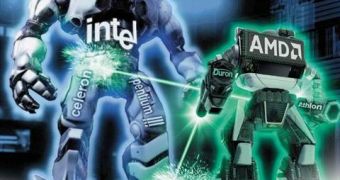The eternal confrontation between Intel's and AMD's processors has been sanctioned by an independent benchmark lab situated in the outskirts of Chicago. The object of attention was the CPU manufacturers' server line of processors, namely Intel's Xeons and AMD's Opterons.
The lab's manager, Neal Nelson, has run an extensive test on quad-cored Xeons and compared them to the Opteron benchmark results. He found out that Intel's Xeons are by far more efficient than the competition's, but, at the same time, the Opterons are the real champions in terms of energy-efficiency.
According to Nelson, the Xeon quad-core servers are up to 14 percent faster than the Opterons in a transaction-focused benchmark. However, the Opteron servers consumed about 41 percent less power for the same test. The benchmark is comprised of a client-server test, in which about 500 users submit individual requests from 32 client machines to a server running Apache2, MySQL 5 on a Novell SUSE Linux Enterprise platform.
"By themselves, the Intel processor chips may use less power, but all current Intel Xeon servers require the use of Fully Buffered memory modules," Nelson said. "These FB-memory modules appear to consume more power than the DDR-II memory modules used by the AMD based servers. The result is that in many cases an Opteron based server actually uses less total power than a Xeon based server." The test servers used 1 GB memory modules in 4, 8 and 16 GB total memory configurations.
Nelson's test is different from the standard SPEC benchmark, which uses a single client machine performing batches of 1,000 transactions on a Java program running on the server. Since the SPECPower test does not perform physical disk I/O operation and is based on simple network traffic, it does not imitate a normal working environment. Nelson's test, however, is a more down-to-earth approach and simulates the usual operations a webserver has to deal with each day.
"I am certain that these test results are correct," Nelson continued, "I am so certain that I have begun to offer my customers a money back guarantee if their real world experiences do not agree with my benchmark data."

 14 DAY TRIAL //
14 DAY TRIAL //